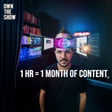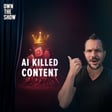Mastering AI for Marketing Introduction
00:00:02
Speaker
Welcome back to the AI driven marketer where I'm helping marketers master AI to do more, do better and overcome the overwhelm today. I have
AI Strategies with Jeff Livingston
00:00:11
Speaker
the privilege of talking to Jeff Livingston, who is the founder of cognitive path and about how to craft AI strategies
00:00:18
Speaker
and actually integrate them into your business objectives. Because
Integrating AI into Marketing
00:00:23
Speaker
I often find we talk about AI from a high level, and we talk about the nitty-gritties like building custom GPTs in my podcast and a lot of other podcasts. So Jeff, I'm excited to talk to you about how to integrate these two things to actually create a holistic strategy for marketing departments. So welcome
Jeff's AI Journey Since 2018
00:00:40
Speaker
to the show. Thanks for having me, Dan, and the honor is all mine. So I really appreciate you reaching out and asking, and hopefully we can return the favor sometime.
00:00:48
Speaker
I have to ask, when was the moment for you that AI became the thing you're just going to go all into? It's funny because I started writing about AI at 2018 and how it's going to impact the marketing department, so way back. Early.
Shift to Generative AI
00:01:03
Speaker
Is that back when Salesforce was introducing Einstein and they were doing that big push?
00:01:07
Speaker
Yeah, kind of, but also too, when I really started to see Siri and Alexa kind of take hold and they were commonplace and I was watching my kid have conversations with Alexa, which is a little bit creepy, right? Here's my kid literally talking and having this weird conversation, but then I watched it and it was fascinating and I realized
00:01:28
Speaker
how quickly this was going to move. And obviously,
AI's Market Potential with GPT-2022
00:01:31
Speaker
back then, it was much more of an ML world before generative. I ended up taking a vice president marketing job with a company called e-value serve, which is, you know, the name's not optimal, perhaps, but the offering was we did a lot of great professional services work.
00:01:48
Speaker
building ML systems and AI systems for some of the world's largest companies like Morgan Stanley, Mizuho, Vanguard, McDonald's, American Honda, I mean, on and on and on and on. So I really had to come to know AI and sell it. And I did a couple of years of that. And then obviously, the crossing the chasm moment for generative was GPT.
AI in Major Tech Companies
00:02:13
Speaker
November of 22, which just seems to be this fine line. It's kind of like, remember when Twitter launched at South Line, everybody was like, Twitter, oh my God, what is this thing? This is incredible. And I think that was 2007. It was similar to that, maybe even more of a lightning bolt, probably more of a lightning bolt. And I realized how much potential. And I said to myself, this is marketing's turn. I'm not going to get into this.
00:02:41
Speaker
went out of my own six months later, and I'm literally marking a year today out on my own. It's fun. I used to make fun of the machine learning stuff early on, even though I knew it's either you were killing it because you were big and had a lot of resources. I knew AI was powering a lot of the larger tech companies. If you were handling Ubers, if you were using Google products, if you were using some of these big dogs, there's a lot of AI and machine learning underneath that's driving a lot of what made it good.
00:03:09
Speaker
for a long time. I don't think people realize that AI was actually a big part of it underneath. Sure. And before chat GPT came onto the market like it did. But in
AI in Social Media Algorithms
00:03:20
Speaker
marketing, man, it was I felt like for small and mid sized players, AI wasn't still very approachable or usable until maybe like Jarvis came onto the market shortly before chat GPT. Yeah, I would agree with that. I mean, if you think about
00:03:34
Speaker
what happened with social networks and how algorithmic programming went with that, basically what you receive versus what you subscribe to, and the difference between that and the necessity of driving engagement to build advertisement. We've really been living in an AI world for quite some time. We're just officially calling it that. Now the AI talks back at us, literally in text as well as with our speakers.
00:04:02
Speaker
It's definitely very interesting. The other thing about ML, it's so quick to brush it under the rug. But man, if you're going to be serious about AI, you're going to be dealing with ML. It's just inevitable, particularly with generative. I mean, when you build a complex AI model, I can't imagine not having both of them in that model.
AI Strategy vs. Business Strategy
00:04:24
Speaker
you're looking at CDPs and really rolling out generative AI within a brand framework to personalize communications to larger customer basis, you're not going one-to-one anymore. You're going one-to-many and you really need ML to help you get there.
00:04:40
Speaker
So when you're talking to executives, what's the general idea that you're giving them or the vision you're casting for them for how AI can specifically drive marketing, though you can speak to the overall company. How are you casting that vision for them and how it can play a role? And let me make it even more distinctive. How would you do it for a small, mid and enterprise level company? How do you differentiate them? Yeah. So to me, I think the real
00:05:08
Speaker
The real challenge with AI is, do I need an AI strategy, or do I need AI to serve my business strategy? And that's where we begin. And we get back to the business strategy, because really, I see AI as lighter fluid. To me, this is something that can accelerate a lot of activity, maybe even break through parts of an area where I was challenged and I couldn't scale.
00:05:34
Speaker
And I think that's particularly relevant
Scaling Small Business Marketing with AI
00:05:37
Speaker
to small and medium businesses. Now think about that. Like if I'm an enterprise fund procter at Gamble, I have a brand team for every single product, right? I have resources out the wazoo. I mean, I guarantee you they don't feel that way, but they do, right? They have the agencies and I'm sure they have their budget struggles and everything, but they have the law of abundance where they have to select which resources.
00:06:02
Speaker
When you're a small company, you have no resources and you have maybe one marketing manager, maybe two, maybe a very small advertising budget. How am I going to make this thing go further? How am I going to build this campaign when I've got somebody that's running all over the place and like he or she may only be able to dedicate 10, 15 hours to this thing?
00:06:23
Speaker
Well, all of a sudden now they can scale their efforts a lot quicker with generative AI. So it becomes really a much more of a focus of what's my key initiatives? Where are our biggest problem areas? And can I find one particular problem where I can use this tool to maybe make a breakthrough and see how it works? And if you can
Aligning AI with Business Goals
00:06:42
Speaker
find that area and you can really show some quick hit results, and I'm sure you know this, if you can find that right pilot to start with, you can really develop a nice appetite for AI
00:06:54
Speaker
So when you're crafting, helping companies craft business strategy, do you usually say like, hey, hand me your business strategy, I'll show you work, AI can fit into it. Or do you actually, I'd imagine in some places, you actually want to think about like, what's capable, what's possible with AI and let that inform a little bit, inform the objectives to some degree? Or is it the other way around? Yeah, usually when I'm talking to, I mean, first of all, I find that
00:07:23
Speaker
particularly in larger enterprises, the CMO can't go off and do this on their own. Like they have to have the alignment with the CTO and legal and everything. So there was a huge team sport conversation that happens. And I swear with the larger enterprises and more political organizations that I'm in Washington, DC, so I deal with a lot of those.
00:07:45
Speaker
you're looking at probably 80% of the battle being political and relationships and governance related, right? It gets off the mission really quickly and really focused on making sure that you can get everybody aligned and working together. And that's just unfortunately the way business is and it's always been like that. Well, let's take a step down the ladder then and go to maybe like your 300 to 500 person company. Good size,
Challenges in AI Adoption
00:08:12
Speaker
but not enterprise yet. Not enterprise yet.
00:08:16
Speaker
Yeah. To me, again, it gets back to like, what are you on the hook for? What'd you commit to and where are you really struggling? I mean, to me, there's so many marketing objectives. We're always under fire, right? We're always being told we need to do more with less. Unfortunately, like half these yo-yos that run companies think that they can market better than their marketers, which is always funny because then they fire marketers periodically and find out how little they know. And I've seen that over and over again.
00:08:44
Speaker
But you know, generally right now in this particular time and era in 2024 marketers are under fire. So what is the one thing that's going to make you a hero?
00:08:54
Speaker
if you deliver on this outcome this year. And invariably, it's some sort of a revenue goal. And so then you have to look at that lead gen process. How are you developing leads? How's that working out? Where are the biggest problems you're having getting to market and actually convincing people? It may be an analytics problem sometimes where we're out there a lot. We're just not actually getting a lot of results.
00:09:19
Speaker
Why is that? Maybe that's something that you can really get into some business intelligence and use some old school AI tools and just get into that. But really finding
AI's Transformative Marketing Role
00:09:29
Speaker
out what the problem is and where you can scale is probably the most important thing. I mean, to me, again, the problem with AI right now is that there's so much, and I forget my dog, there's so much going on, there's so much practice
00:09:45
Speaker
and discussion happening and so much hyperbole. And then you got people like Elon Musk saying everybody's going to lose their jobs. And Sam Allman saying 95% of creatives won't have jobs. It's nuts. It's all noise. It has nothing to do with the real business and marketing. And that's what you have to focus on. Focus on where you're going to be promoted.
00:10:09
Speaker
where you're going to get that raise, where you're going to get that bonus. And if you can find the problems there where AI can really help, usually it's scaling content, creating diverse types of content, beating your budget. So I don't have budget to create the images. I don't have budget to create the videos. Well, maybe you actually do, because you could probably do with AI. Well, it won't be the same quality. It doesn't have to be the same quality. What are your customers' expectations?
00:10:37
Speaker
You know, have you tried it? Those kinds of things. And really getting through those types of conversations, that's where you can make some success for a smaller, I would call a three to 500 person, a small to medium enterprise. I often hear people say
AI vs. Human Content Creation
00:10:53
Speaker
that AI is just not as good a quality as a human. I'm like,
00:10:57
Speaker
Really? Depends. I'm like, one, you clearly don't know how to use AI well. Just like, I don't know how to play basketball. So if you hand me a basketball, I'm not going to make the hoop. But somebody who's been playing basketball for a while can do really well. AI is a skill. You can get good with it. And then two, have you read the work some of the writers are putting out on blog posts?
00:11:18
Speaker
Like i remember seeing blogs for milchimp and i'm like. Because i was right i was competing with them on a keyword around vlogging years ago and i read their their blog about vlogging and i'm like reading and like this writer hasn't picked up a camera in their life right have no idea what they're talking about their grammar is good but they clearly know nothing.
00:11:37
Speaker
AI could have written like this in a second. Of course, this was a couple of years ago before GPT had launched, but I'm like, are we really doing that good at content as marketers most of the time in most organizations?
AI Enhancing Creative Tasks
00:11:50
Speaker
It's so funny. I was looking on the side of a photographer, so I have a lot of fun with that creative side. It's where I kind of get to air out a little bit and get into the tactics of actually creating. I write as well.
00:12:07
Speaker
And I just wrote a blog post last night. I'm one of those people that doesn't like AI to write my stuff, but I do like it to correct it because that saves me a ton of time. There's a 5% problem where you have 5% of the population that are truly excellent, right? They're very good. Let's just say. And they're going to look at their AI companion and say, you know what? I can beat that every time. And maybe they're right.
00:12:34
Speaker
I would say they're probably right most of the time, not all the time. That being said, if you can't find a way that these tools can help you and cut down your workflow time, like I was just referring to mine, like I'm definitely going to take that horrible rough draft and throw it in Grammarly Pro. And then once I clean it up and get all the suggestive phrases put in there, I'm going to throw in a quad and say, where are the weaknesses? You know, and I'm going to get that thing pretty beefy before I push play, so to speak, or push publish.
00:13:04
Speaker
but it's gonna save me about two or three hours in my process. That's invaluable. If you can't find that kind of time savings with AI, then you just don't wanna use AI. That's my take on it.
00:13:16
Speaker
And then the other 95% of the population, hell yeah, let's use it. Like everybody's worried about salespeople using AI. Are you kidding me? Have you read some of the sales emails I get? I mean, these things are horrific, right? Anything. Please use the AI tools. It could do no worse than what you're currently doing now. There's a prompt, EG your template. Don't mess it up, please. But the other thing too is I have a photograph that's hanging in the other room and I was looking at it the other day. It's a beautiful composite model.
00:13:44
Speaker
I put her in an alley and then I put all these butterflies and stars in there and all that stuff. It wasn't a true photograph, although it was based off a photograph and it was using about six or seven different images. It had a drone in there too. And it took me about 12 or 13 hours to make that photo. I could do that in five minutes on mid-journey.
00:14:11
Speaker
And yeah, we'll look exactly as photogenic as the one I have on my wall. No, but it's 90% there. That's good enough for me, and particularly for marketing, I think. Yeah. And most marketers aren't trying to win photography contests. They're trying to communicate the right idea to the right person at the right time. So 95% there is probably better than what you would have gotten the stock photo from Getty Images anyway. 100%. 100%. That's the
AI in Marketing Content Improvement
00:14:36
Speaker
other issue, right? Like, Getty just doesn't have it. Shutterstock doesn't have your idea.
00:14:41
Speaker
Yeah, I needed a picture for just a thumbnail for a different podcast that I produce. And I needed a picture of a CEO in a suit, like changing the wheel on a bus. I'm like, now I have a camera and I could go stage this and it needed to be in like a city. I needed to look like an executive kind of thing.
00:15:01
Speaker
And I'm like, I could go downtown Nashville, find some dude, put him in a suit. And maybe like, if I'm going to be lean and dirty, like literally find a bus on the side of the road and walk up to it with a wrench and be like, hurry, post, and then go run away and take it so much time. Even if I'm doing it down and dirty, there's just not going to be a stock photo of this, but with mid journey, you're talking 30 seconds. I have four, four versions of it. One of them is good. Upscale that done. I have my image and it's a great image.
00:15:28
Speaker
I mean, and you're talking about a guy that's been hired by Audi USA to go photograph things. And the first thing I go to when I want to populate a deck, go right to mid-journey. Mid-journey. So that's one of many things people can be using AI for. And I love mid-journey and what you can do with Dolly and even Photoshop's AI ability now is just fantastic. Yeah, Copilot too, right? They can help out quite a bit. I haven't started using Copilot for images. Do you find that it's different than using Dolly directly?
00:15:56
Speaker
Whereas it's pretty much just Dolly, you get to use it for free. Yeah. I don't really love Dolly that much, but yeah, there's nothing wrong. It's like whatever, you know, it's like kind of like the whole religious war. Do you like quad or Gemini or GPT? It's like, whatever you're using one. So that's good. And that's the way we got to look at this stuff. Let's encourage people to use these tools. Cause we still have a lot of people with their heels dug in.
00:16:23
Speaker
The co-pilot's interesting. I find it gets me about 25%, 30% of the way there. But what it will do is it will create an outline. It will create some slides. You're going to have to correct like 60%, 70% of it. But if you're one of those people like me where I know we're creating PowerPoints that maybe aren't special to me.
00:16:47
Speaker
This can help quite a bit. And again, using that versioning,
Scoring AI Use Cases
00:16:51
Speaker
you could take Microsoft, co-pilot within PowerPoint, upload the document right into PowerPoint, and it'll build a deck off the document. Again, it's not all the way there. You're going to have to do some work. But man, again, big time savings.
00:17:07
Speaker
So a lot of companies are dabbling and they have marketing plans, stated problems, objectives to meet the problems. How do you bridge the gap between these two? How do you craft strategies that bridge their problems to the tools that they're dabbling with now?
00:17:24
Speaker
So what you're really talking about are use cases, right? Where you build an AI model that's probably a little bit more than a subscription, you know? And I think to me, that experimentation phase is absolutely critical, like absolutely critical. Do it. But once you get hungry for this stuff to do more and really impact your larger processes, that's where you get into like, okay, what's possible with a use case? And to me, the best thing you could do with use cases
00:17:53
Speaker
is to not dismiss them, always whiteboard them. And then one of the things we do with CognitivePath is we have a use case kind of a framework where we literally, me and Greg, we will go through with clients and we will score their use cases.
00:18:12
Speaker
So usually these use cases resolve a problem such as how do we create business intelligence reports for customers based off of their inputs or how we provide advice based off of our user manuals or our guidance documents in a manner that's useful to the client or the customer or the member. If it's an association, we have a lot of associations.
00:18:36
Speaker
And what we'll do is we'll score that, like what's the business impact, right? What's the ROI? What's the technical feasibility, right? Because that's a lot of it. What's this gonna cost me?
00:18:49
Speaker
If I have to do a private instance and my data is a hot mess and I got to clean up all my data to get there, this might be
Scaling AI: Data Governance
00:18:56
Speaker
a lot more of a lift than I think. You'll see that a lot when you really start talking enterprise AI. You get into the data and I think every marketer knows this and nobody really wants to talk about it. Their data tends to be a hot mess.
00:19:13
Speaker
There is no structured data. If you're getting into somebody's WordPress, their tags are usually a hot mess. They don't have any of their content organized. They have PDFs from 2003 still around that hasn't been cleaned up in any way or tagged in any way.
00:19:29
Speaker
on and on and on and on, all this content, all the different diverse things they're doing on social networks, they're not bringing in, they're not tying in, what's that, Canva? They're not tying in their Canva content, they don't have it on a server, they don't have a tag by type of asset, they don't have anything cleaned up. You get into cleaning up your data like that, and all of a sudden it's like, hey, we're done, we're not doing this too much. So there's a lot of complexity to consider.
00:19:59
Speaker
Well, I mean, this makes a lot of sense to me because I've seen like growth teams prioritize growth hacks or growth strategies they want to implement, maybe tactics. But you're talking about like taking all the problems and then rank stacking them based on a few factors, right? Kind of scoring them based on how painful is this problem?
00:20:19
Speaker
You didn't say that, but I'd assume that'd be a line item. Like how painful, how painful is it? Like, um, how much would it cost? How much would it cost to fix? What's the ROI if we do fix it? Um, difficulty of fixing it. And then one, you said, I can't remember the word you use, but it was something like how likely, like, can we actually do this with AI? Question mark. You know, like.
00:20:42
Speaker
I think it was feasibility was probably the word you use. Sora sounds good, but can it do it? Can it do it, right? I mean, Sora's not even out yet, so. I know. That's classic open AI, right? Classic open AI. This is coming. Oh my god. Everybody's like, oh, it's been a few months now. I know.
00:21:03
Speaker
The thing too is also, is there alignment within the organization to do it? Are people inside going to freak out if we start doing this? Am I going to be dealing with the chief legal officer, general counsel, or is HR going to be barking at my neck? I mean, those are real issues. And I think depending on how much political will there is with marketing and how well marketing is tied to the larger executive team, this could be a big issue.
00:21:30
Speaker
What would you say if like a CMO comes
Transforming Business with AI
00:21:32
Speaker
to you and it's like, Hey, I just, we're doing things pretty well. I just want to, I want to start overhauling the whole thing to be like AI driven.
00:21:43
Speaker
How would you think about approaching that? Do you just start with quick wins? We rank stack them, we find some wins, but maybe you've gotten a few wins, but they're not like, okay, let's trickle into everything else. Do you just go by the rank stack and keep working on things? Or is there a larger approach you would take in order to make sure there's a cohesive plan to how you're using AI throughout the department? Yeah, once you're serious, you're definitely getting into data governance right away because everything that AI does well, it does well because it's
00:22:12
Speaker
but given the right information to do well. Even generative AI is a probability engine, right? I mean, I think of AIs as really engines, right? They're probability engines. So people can laugh at ML all they want, but really they're looking when they're on a generative tool, they're really dealing with machine learning that's spitting out some sort of a result based on the probability of it being correct.
00:22:36
Speaker
Prompting is all about providing that AI the right information. I often tell marketers, I don't know how to prompt. I'm like, do you know how to write a creative brief? Yes, that you know how to prompt. And the reality is getting your data governance straight.
00:22:52
Speaker
is the most critical thing you could do for an AI future because it's going to pave the way for everything you want to do from small to large, from grand to a simple fix me, right? Even like AI meeting notes, what are you doing with your AI meeting notes?
00:23:11
Speaker
Are you just leaving them on the meeting tool? Are you leaving them on Otter? Are you leaving them on read AI? Are you downloading them and putting them in a folder and tagging them by name, by date, by conversation and any other relevant conversation tags? Because the reality is that transcript and that video content can be mined later for unstructured content and insights. Like there's a company, it's called a, I don't know if you've heard of them, known well.
00:23:39
Speaker
Yeah, no, I've been I've been on their podcast. I've featured Courtney Baker on this podcast twice now. Courtney is amazing, right? Like they'll literally take all those meeting notes and tell you when you're about to lose your customers based off of like how valuable is that? Right? If you're a professional services firm, it's huge. Give that to me now. So everything
00:24:00
Speaker
Future forward can be cleaned up and structured well. I understand the difficulties of going back and cleaning up years and decades of content. That can be something that even the most robust and future-minded person may not have the appetite for or the budget for, frankly. But you can't put in those governance policies to do that today and moving forward, making sure that you're always cleaned up. And in the future, we'll eventually be able to get all that stuff done with an AI anyway.
00:24:29
Speaker
A lot of people talk about how early adoption of AI gives farther competitive advantage because it gives your AI longer to be trained on your data. So if you start now and start feeding at the data, it will be better two years from now versus people who are starting a year from now will only have a year's worth of data. And I'm kind of like, well, what if you gave it two years? What if they had their data and they had two years worth of data? I'm like, I don't know how that.
00:24:55
Speaker
I don't know, maybe it just gets more feedback faster and therefore it can go faster, but I don't know anybody who's doing that. But I know data is the big game. People who are playing at the next level have custom data for it to train on.
00:25:07
Speaker
Uh, even if, but it is interesting to just think about like normal business data. Like you don't have to have like Gong level meeting, like all the, all, you know, Gong has a competitive advantage because it has all the sales records for all the different meetings. Right. And then you come up with competitive intelligence because that's a moat they have. But even a normal business has meeting notes that if accessible by AI correctly in the future, it will have game changing implications later.
AI for Market Share Enhancement
00:25:36
Speaker
the, I love what you just asked. I think that's a good question. I'd be curious to hear what you think about like people that say, well, this is the best way to do AI. I think nobody really knows. Yeah. I think it's a hypothesis right now. I've heard some really strong, it's actually a sales leader named Jim Dickey who says that on the sales front, this is going to be a big deal because you're, if you can get your data in order now and start training AI on its ability to better predict future close, closing,
00:26:05
Speaker
close rates will get better and better every year because it'll be trained more and more on what sales reps are doing now. I haven't seen it, but he also talks to way more people than I do and is in a lot of more rings. I'm like, maybe it's true. Here's who's really getting trained on it, on how to use the data. It's the humans.
00:26:25
Speaker
Right? Like, let's be honest, like, it's how to work with AI. That's what you're learning. The algorithms we're going to have in two or three years are going to kick the shit out of the ones that we have now. And they're going to learn a lot quicker. So I would hypothetically say to you, your AI system that you're training on now that you're getting smarter and better. Once there's a different algorithm in place, like, how's that going to work? I mean, the reality is, is you're going to know how to use it a lot better. And I don't know if that future system will be better or not.
00:26:53
Speaker
I think there's two other factors too for being a nerd. Two other factors I think being an early adopter gives you a major advantage of is one is you just spoke to is just skill development. Totally. The faster you can get your employees and your middle management trained on this, the more you can go through it. I'm reading a book right now. I'm blanking on the name of this book. The one highlight it's given me, as nerdy as this book is, is like, hey, everything we do is systems oriented in business to deliver consistent results as a business.
00:27:23
Speaker
Those systems are based on old models. AI will bring new models. So in the future, we will have to do the thing where we have to learn, unlearn, and relearn how to do business differently because AI changes the playing field of what can happen and how it can happen.
00:27:43
Speaker
So we have to essentially the sooner you start doing this ai thing the more you can start unlearning What was possible to relearn what's possible now so that you could start the transformation process sooner and that is a competitive advantage because speed is Speed the market speed is really the the best advantage if you think about what's going to happen for companies that embrace ai in the next I guess 18 months and
00:28:08
Speaker
And I don't know if there's even that long of a window. Maybe it probably is. Every time I think it's a short window, it seems to be longer. But you're going to be not just better at using AI. You're going to be building a bigger customer profile than your competitors because you're accelerating faster with your go-to-market efforts. And to me, when I look at the real advantage of AI,
00:28:32
Speaker
It isn't so much that you can use it or that your content's better or worse or anything. It's your market share. Flat out. Let's get back to the business. If your business is kicking the crap out of its competitors because you're getting a 10 to 20 or 30% lift on everything that you're using AI to optimize, you're dangerous, right? You're getting into places like where Amazon is, you know, with its online marketplace. It's the reason why it was so much
00:29:01
Speaker
more powerful than other online retailers and why it built its market shares because it had ML tools in play to make recommendation engines, to close you, to offer alternatives, things that nobody had. Now that everybody's got it, it's too late. It's too late. They're all playing catch-up. Walmart playing catch-up. Target, catch-up. All the individual niche players within each area. Running warehouse, I'm a runner.
00:29:27
Speaker
catch up, you know, and they can't compete or scale the way that Amazon can. So you have to look at it like that. Am I going to be first to market and lead and build enough of a lead that nobody can catch me or at least build enough of a share that it's going to be really hard to knock me out of like the leadership position within this sector where I'll be a top three or top five company, or am I going to just let other people do a Y, see whether or not this thing's going to work out?
Successful AI Implementations
00:29:56
Speaker
with companies on upscaling their teams and helping them transition to this AI world, what have been some of the most ROI, like the best use cases that have achieved the highest ROI that you've seen so far? Well, I think the one that I saw was the best was actually an e-value surf one.
00:30:21
Speaker
which was Vanguard, but what they did was they unified all their customer data. So like literally they didn't know where everybody was touching them. And when they unified all the customer data, they were
00:30:34
Speaker
much better able to automate their cycle and trigger sales efforts. So for example, if you think about a good portfolio, it's going to instantly get somebody that's working with that person, right? They'll have that human touch if you would.
00:30:52
Speaker
versus most people like me get the bot or just the online portfolio, right? Yeah. So how do you know when somebody is the right person? Okay, we've got them that worth. We know what their data is based off of all of our third-party information. We know that they've been on our site. They've been here, here. They've been researching us on Google. They've been doing all this information about Vanguard. We should have a sales guy call. And they're able to have those sales guys call them within 24 hours.
00:31:19
Speaker
That was incredibly powerful for them. That grew their business quite a bit. I think Vanguard,
AI for Unstructured Data Insights
00:31:26
Speaker
when you look at financial AI and you go on their site and all the bots that they have and how they've built, I think they're still using NLP. I don't think that they've gone full generative just because of the hallucination issue, but they've got really strong advisement
00:31:42
Speaker
through a bot, and I don't think customers really care whether it's Shen River or NLP. They just want that kind of advice. They've really gone all the way through, and they've built this thing the right way, and they've been way ahead of everybody else. That's amazing. It reminds me of just this use case I keep running into, because it's just so helpful. But oftentimes, as marketers, we're dealing with unstructured data from different tools, and it's flaky, and it's weird. It's just a mess sometimes.
00:32:09
Speaker
some of the reports you get more and more I'm finding I'm just dragging and dropping these things straight into chat GPT and be like, Hey, can you help me understand this? Like it can be that vague and it will literally do a good job of reading it and being like, well, it looks like we're looking at this kind of data. And here, let me organize it for you in a pie chart. You're like, Oh shoot, it's actually good. And I've spot checked it to make sure it's actually accurate. And I'll go and rebuild it sometimes, but I'm like, it's usually pretty good.
00:32:34
Speaker
I mean, what people don't get about hallucination is that hallucination usually occurs when the data's not good. Like, you don't have the right information. There's not enough information for it to report out. And you don't provide the guardrails or the clean data on a private instance.
00:32:49
Speaker
to fuel it the right way. So for example, we did a we did a private instance with space until report their aerospace like trade rag. And now people we've locked down all the data so that they can only respond using a rag database.
00:33:06
Speaker
off of their articles, and people are doing whole reports, research reports using the past articles. You know, oh, you don't have the information you want, or you want these 10 articles summarized? No problem. It doesn't just like that. Super valuable.
00:33:21
Speaker
So this is the power and it can be done with huge databases and it can be done with just simple things like you, I don't know, like I noticed even you can connect it to Google drive recently and chat GPT. I wish you can upload it. What you can't do in chat GPT yet is cook connect like a folder or directory of Google drive docs to chat GPT dynamically. So every time it updates, it knows, but that's, I'm like, someone's.
00:33:42
Speaker
I'm sure people have built tools for that. I just haven't used it yet. Yeah, that
Innovative AI Training Approaches
00:33:46
Speaker
smells like private instance to me too, because I think so many businesses are concerned about their data. And candidly, some of them should be if their data is actually valuable, most of them overvalue their data. That's a good case for Microsoft Copilot.
00:33:59
Speaker
Or at least where it's going I don't think it actually does that well yet from the videos I'm watching about it but that's that's the hope that it'll get there and it'll all your stuff will live on Microsoft Drive and it'll be able to based on the right permissions for the user being able to go and look at all the meeting notes and all the excel sheets and all the stuff to help you find real time and permit data based on the business which is.
00:34:20
Speaker
mind-blowing cool. That's where it's going. But today, I'm still drag and dropping stuff in chat GPT to help me analyze one report at a time, which isn't bad because before parsing it sucked. Yeah, that's true. I mean, the summarization capability is just the analytics that it provides. Fantastic. When it comes to training teams, how are you approaching that right now? Somebody's coming in and be like, hey, help upskill my team. How are you approaching re-skilling?
00:34:51
Speaker
So I'm actually deploying one right now, and I'm really excited about this. I can't mention the client for obvious reasons, but because I used to be the CMO of Legends of Learning, which is a game-based learning company, I try to make it fun. To me, if I can get this out of, I'm going to lose my job to AI to, hey, let's experiment together. This is going to actually take away my pain points and make life a little bit easier here.
00:35:19
Speaker
And on top of it, I could win some prizes and beat my peers who I can't stand down the hall. Let's do it, right? Of course, not everybody feels that way. A lot more people are collegiate and friendly. But I'm from Philly, so that's the way I think. And if I can have that kind of fun environment where it's competitive, you get a little team play, you guys get much, you get a brand of prizes going out and swag.
00:35:41
Speaker
then that's what I do. And so I'm literally building a competition where people are building their own use cases. They're experimenting with the tools to create those use cases. They're getting a training session a week and a coaching session a week. And so it's really kind of hands-on, but at the same time, we choose your own adventure kind of thing where there's a spirit of fun and play. And to me, that really embraces
Measuring AI Training Success
00:36:05
Speaker
what we love about learning, which is really seeing things open up in front of us.
00:36:11
Speaker
enjoying it and doing so in a manner where you don't really feel like you're going to be penalized if you fail. Does that make sense?
00:36:18
Speaker
Yeah, so you're giving me a good idea of the approach that you take to bringing fun and competition into the learning. But what does the structure actually look like? Are you starting with, hey, bring your whole team of 20 marketers to an in-person event, and then you're following up remotely afterwards? What is the sequence for that? Yeah, we have a live kickoff event. We've actually themed it around the Olympics because it's coming this year, right? So we may as well take advantage of that. The random prizes are Olympic swag.
00:36:44
Speaker
So maybe if you're the first person to deliver a use case, great, you get a hat. Teams are going to be a three to five people, so kind of structured like a workplace team or maybe a cross-functional team within a department and really addressing some of those departmental issues. And they'll compete against other departments in the enterprise.
00:37:06
Speaker
Yeah. And throughout the day, are you like teaching little bits at a time? Like, Hey, here's how you do go from prompting to super prompting. Here's how you layer it in. Here's how you build custom GPTs. Here's how you can start automating your workflows. Is that kind of how you structure it throughout the day? Or do you kind of stick to, how do you, how do you do structure it? So we do have general prompting, uh, advisement. Like, you know, usually if you have a prompt, it's not delivering the result you want. Why?
00:37:32
Speaker
Is it because you were too complex with the prompt and you need to break it down into smaller prompts? Or is it because you just said, make me a pie? Yeah. Okay. I didn't ask for a pie chart. Well, what did you ask for? You just said a pie. What is a pie?
00:37:46
Speaker
You have to be more specific with the AI. Make me an apple pie. I want a recipe that I can use in an air fryer. OK, completely different ballgame. Also, the AI is delivering what you want, right? Or the LLM in that case. So because there are so many different functions we're dealing with in this particular implementation, accounting is probably going to end up doing a lot of business intelligence, right? They may use some Gen AI, but they're probably going to be more BI focused.
00:38:16
Speaker
IT, I have no freaking clue what they're going to do. I mean, those nuts can do anything, man. They'll figure out something to go play and make their IT systems better. Maybe they'll be a co-pilot, the GitHub version, writing their own code for all I know. They're going to be in a world of hurt because AI and cyber security are going to be a
00:38:33
Speaker
Huge problem. Cyber security. Cyber security is going to be, like, there's one thing I've learned about AI. It's like, it's going to create a huge problem for cybersecurity. God bless you, IT people. Brother, we're in the wrong business if we want to make money in AI. We should be in cyber. I'll tell you that much. I know. I know. If I'm like, if I'm investing right now, I'm investing in cybersecurity companies because they're the ones that are going to be huge over the next 10 years because of the problems. Totally. Sale point go. Go, Octo. Yeah.
00:39:02
Speaker
So so I mean, like, you can see on and on, I've got legal legal is going to be really, you know, I've got PR, I've got marketing, I've got membership, I got this, I got that, you know, it's like on and on and on. So I don't want to tell people how to prompt or not prompt, because I don't know what kind of AI they are. Sure, sure. And what the purpose of the coaching session says is really to get into that with them one on one and really resolve their problems as they're in them. Does that make sense?
00:39:28
Speaker
Do you usually kick off before the kickoff day? Are you usually coming in with some customization for the event based on their business objectives and what their problems are? Guidance, at least. Here's where your annual plan is. How's your effort really contributing to that? How can you best serve that larger ROI or goal? Or can you just create efficiencies to create more time so you can
00:39:53
Speaker
do other activities that will actually contribute to that. I mean, realistically speaking, because there are so many different organizations within an enterprise, what a legal person could do versus what a sales person could do are going to be completely different from an ROI standpoint. So you probably come up with some success metrics before launching it and then having the follow-up. What do the outcomes usually look like after you walk through this process of retraining a team around AI?
00:40:21
Speaker
Well, like most user generated content, you've got probably about three to even seven or eight really good ideas from a 20 team base. And then you've got a lot of, well, that that's interesting. Maybe that can work if we evolve it a little more. Yeah. Maybe you're just like, wow, that's really good, Joe.
00:40:42
Speaker
invite Joe to the AI Council. That kind of stuff, right? So it varies quite a bit. It really depends on the team. But I mean, it's hard to put together like 20 teams and not come away with five good ideas. And really, if you're an enterprise, you look at those ranked in an Excel sheet,
00:41:03
Speaker
That's really powerful because now you have use cases that you can suddenly, when you get funding, okay, let's do number six because, um, we got money for it and it's becoming a problem for the larger strategy. And let's address it. Now I'd
Rapid-fire AI Questions
00:41:18
Speaker
love to wrap this episode up with what I call the fast five. I'm going to ask five rapid fire questions and I need tight answers back.
00:41:26
Speaker
I don't know if I could do that. I mean, I came out with PR, we just win bags. I mean, if you don't, then I'm just going to edit it down. But give me the hot take without the context. Okay. So let's give it a shot. All right, then. Question one, what's your favorite AI tool or resource right now? Claude. What's one book you'd recommend for anyone looking to learn more about AI?
00:41:54
Speaker
I think it's a Kaifu leaves and I hope I said that right. AI 2048 was it? Yeah. What's the biggest hurdle you're still running up against with AI marketing? Limited vision. If you could automate one part of your daily routine with AI, what would it be? Agenda creation. What's the most exciting AI development you see on the horizon right now?
00:42:24
Speaker
Multimodal contact creation. Fantastic. See, you crushed it. It's fast and super concise.
Future of Personalized Multimedia
00:42:35
Speaker
Awesome. Agenda creation, I feel like it's kind of getting there with the meeting notes, but it's like... Yeah. Not there yet. I know so many things, especially that last question, there's so many things on the horizon, so I'd love to see what people are looking forward to the most. I think like, tell me how you feel as a marketer, but the ability to deliver some sort of a cohesive multimedia document, like a webpage, for example, with diverse media types, man, that's the dream, right?
00:43:04
Speaker
Yeah. I mean, right now, I think I had a revelation about a month ago that hyper-personalization was going to be one of the major factors that AI was going to be able to produce.
00:43:15
Speaker
many mean like real time hyper personalization. Like right now I'm dabbling with it in my, I have an email, like a free email course. In fact, good plug for the AI driven marketer.com course. You can check out my AI fundamentals course. The thing that's cool about it is like you get to put in a few pieces of information like your role industry you sell to and what you're selling. Those three pieces of information in the course is customized for you based on those three pieces. And it does
00:43:42
Speaker
AI does a remarkable job of just taking the lesson transcript, those pieces of information in the prompt I wrote, and giving you like, okay, prompt 101, how to go from prompting to super prompt is lesson one, of course, like where you always have to start. It comes up with very different suggestions for a CMO in a beauty industry than it does for an email marketer in the FinTech industry.
00:44:01
Speaker
as it should, but it's still way better. But I'm like, that will happen across the board for websites, email, social. Totally. It's all going to be hyper-personalized in the future. There is happening with the big brands, right? I mean, the big brands are doing that already, right? Now it's getting democratized. I know, but think about movies that are personalized. Right now, Netflix recommends the top movies to you, but wait until the individual storylines customize.
00:44:26
Speaker
It's going to be more video game-esque, less movie, and this is getting outweighed into the future. It's like choose your own adventure, right? Yeah, exactly, but it's going to be crazy. Marketing is going to be part of that too with website. We've talked about personalization and websites, but come on, it's like insert company name. I'm like, ooh. Yeah, yeah.
00:44:46
Speaker
I mean, we're still talking about what my problem is and adapt your solution to my problem based on what you already know about me on your website. Here's a quick take for you, Dan. Which media franchise would you want your personalized content to happen with first?
00:45:04
Speaker
which media franchise. You mean like movie stuff? Movie, TV shows, sports. What kind of media content would you most want to interact with on a personalized basis where the AI would serve it to you? Like just my YouTube content, honestly. I'm addicted to just going to YouTube to learn stuff from simple like, how do I get my Bermuda grass to like stop growing the way or to like grow better because it started to die out in the backyard. I would love personalized content about that.
00:45:33
Speaker
based on where I live in near Nashville, based on the season that I'm running to, based on what it's seeing, based on this lesson that this YouTuber put out, it'd be fantastic. So education would be the biggest piece for me. But otherwise, like, and I think the one I've thought about a lot is kids books. Yeah. I've made kids books and they're hard to make, but they're really fun.
00:45:56
Speaker
But I can see a day where some smart company takes what I want to teach my kids and what they're into and what in my background and weaves personalized stories. So it's print on demand. One book, one of one right made for my kids with their freaking names in it. And I went to teaching them their growth mindset. And it knows that my they both play soccer. I'm like, I want that kid's book to read with them.
00:46:19
Speaker
I've got a book for you. It's called Neil Stevenson. It's the Diamond Age of Young Ladies Illustrated Primer, where it literally is an AI primer teaching this. Three different girls in three different places, the same book, How to Live Their Lives. It's really interesting. That's really cool. I'll check that out. I'm not going to lie, brother. For me, it's got to be Star Wars. I want to be my own Jedi.
00:46:43
Speaker
Oh, you're really, you're probably really bummed that Star Wars or a Disney shut down that whole hotel. Did you get in there before they shut it down? Nope. Nope. My wife's more bummed than I am. She's a real Star Wars fan, but yeah, my kid's like, uh, you guys are old. Yeah. It's well, it's funny that people that grew up with this stuff now have like adult money and can really get into it now.
00:47:08
Speaker
I have a lot of peers that are like into Pokemon cards and stuff. And it's like really interesting because my kids are into it. I'm not into it, but I have neighbors that are into it. And I'm like, wow, this is, this is a thing. It's amazing. You grow up with stuff as kids and now you have adult money to like spend on it. It becomes a really interesting thing. A hundred percent right. But yeah, no, Star Wars would be really fun to see hyper personalization with. Cool. What color lightsaber would you have?
00:47:36
Speaker
I don't know. I mean, my favorite color is red, but I don't know if I'd go dark side. You don't want to be a Sith Lord, no. No, I'm like, it's too bad. Why did they only give red ones? I don't know. It says like the light side has all kinds of color options. If you're evil though, you instantly go red. Yeah. So I don't know, the dark saber was pretty cool. That was different. Yeah, yeah. Right. Mandalorian, right? Yeah. Yeah. I don't know if you can call that a light saber, but it's in that. It's in that realm. It's in that realm. I'm with you.
00:48:07
Speaker
Cool. Jeff, thank you so much for joining me on the AI Driven Marketer. Where can people learn
Episode Wrap-up
00:48:13
Speaker
more about you, the trainings that you're doing, and everything you have going on regarding AI marketing? CognitivePath.com. It's the hub. You'll find everything you need right there. Awesome. Go check out that website. Find out what you can learn about Jeff. Thanks for joining us again today on the AI Driven Marketer.
00:48:31
Speaker
Dan, it's a pleasure and thank you so much for your time. Can't wait to have you on the no brainer podcast. You're awesome, man. Thank you.




![What’s Your Authority Score? [The 5-Factor Test] image](https://media.zencastr.com/cdn-cgi/image/width=112,quality=85/image-files/630c9f06819f8b3dba5fa460/cfbaccba-f587-45de-a41f-e2c99c15e2a5.png)
![The Audience Growth Engine [Full Framework] image](https://media.zencastr.com/cdn-cgi/image/width=112,quality=85/image-files/630c9f06819f8b3dba5fa460/46b84fd1-e856-4687-9aee-6b4a7e0bc7ff.png)



![The "Dream 100" Execution Plan [Google Sheet System] image](https://media.zencastr.com/cdn-cgi/image/width=112,quality=85/image-files/630c9f06819f8b3dba5fa460/fcd89374-76a4-4e58-a2e3-2bb7ddda4364.png)










